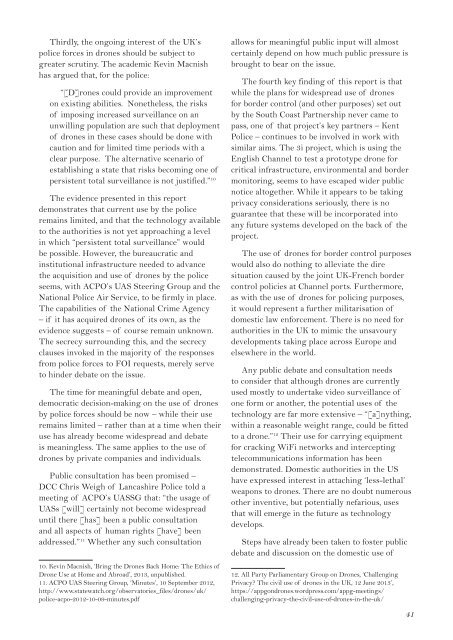Create successful ePaper yourself
Turn your PDF publications into a flip-book with our unique Google optimized e-Paper software.
Thirdly, the ongoing interest of the UK’s<br />
police forces in drones should be subject to<br />
greater scrutiny. The academic Kevin Macnish<br />
has argued that, for the police:<br />
“[D]rones could provide an improvement<br />
on existing abilities. Nonetheless, the risks<br />
of imposing increased surveillance on an<br />
unwilling population are such that deployment<br />
of drones in these cases should be done with<br />
caution and for limited time periods with a<br />
clear purpose. The alternative scenario of<br />
establishing a state that risks becoming one of<br />
persistent total surveillance is not justified.” 10<br />
The evidence presented in this report<br />
demonstrates that current use by the police<br />
remains limited, and that the technology available<br />
to the authorities is not yet approaching a level<br />
in which “persistent total surveillance” would<br />
be possible. However, the bureaucratic and<br />
institutional infrastructure needed to advance<br />
the acquisition and use of drones by the police<br />
seems, with ACPO’s UAS Steering Group and the<br />
National Police Air Service, to be firmly in place.<br />
The capabilities of the National Crime Agency<br />
– if it has acquired drones of its own, as the<br />
evidence suggests – of course remain unknown.<br />
The secrecy surrounding this, and the secrecy<br />
clauses invoked in the majority of the responses<br />
from police forces to FOI requests, merely serve<br />
to hinder debate on the issue.<br />
The time for meaningful debate and open,<br />
democratic decision-making on the use of drones<br />
by police forces should be now – while their use<br />
remains limited – rather than at a time when their<br />
use has already become widespread and debate<br />
is meaningless. The same applies to the use of<br />
drones by private companies and individuals.<br />
Public consultation has been promised –<br />
DCC Chris Weigh of Lancashire Police told a<br />
meeting of ACPO’s UASSG that: “the usage of<br />
UASs [will] certainly not become widespread<br />
until there [has] been a public consultation<br />
and all aspects of human rights [have] been<br />
addressed.” 11 Whether any such consultation<br />
10. Kevin Macnish, ‘Bring the Drones Back Home: The Ethics of<br />
Drone Use at Home and Abroad’, 2013, unpublished.<br />
11. ACPO UAS Steering Group, ‘Minutes’, 10 September 2012,<br />
http://www.statewatch.org/observatories_files/drones/uk/<br />
police-acpo-2012-10-09-minutes.pdf<br />
allows for meaningful public input will almost<br />
certainly depend on how much public pressure is<br />
brought to bear on the issue.<br />
The fourth key finding of this report is that<br />
while the plans for widespread use of drones<br />
for border control (and other purposes) set out<br />
by the South Coast Partnership never came to<br />
pass, one of that project’s key partners – Kent<br />
Police – continues to be involved in work with<br />
similar aims. The 3i project, which is using the<br />
English Channel to test a prototype drone for<br />
critical infrastructure, environmental and border<br />
monitoring, seems to have escaped wider public<br />
notice altogether. While it appears to be taking<br />
privacy considerations seriously, there is no<br />
guarantee that these will be incorporated into<br />
any future systems developed on the back of the<br />
project.<br />
The use of drones for border control purposes<br />
would also do nothing to alleviate the dire<br />
situation caused by the joint UK-French border<br />
control policies at Channel ports. Furthermore,<br />
as with the use of drones for policing purposes,<br />
it would represent a further militarisation of<br />
domestic law enforcement. There is no need for<br />
authorities in the UK to mimic the unsavoury<br />
developments taking place across Europe and<br />
elsewhere in the world.<br />
Any public debate and consultation needs<br />
to consider that although drones are currently<br />
used mostly to undertake video surveillance of<br />
one form or another, the potential uses of the<br />
technology are far more extensive – “[a]nything,<br />
within a reasonable weight range, could be fitted<br />
to a drone.” 12 Their use for carrying equipment<br />
for cracking WiFi networks and intercepting<br />
telecommunications information has been<br />
demonstrated. Domestic authorities in the US<br />
have expressed interest in attaching ‘less-lethal’<br />
weapons to drones. There are no doubt numerous<br />
other inventive, but potentially nefarious, uses<br />
that will emerge in the future as technology<br />
develops.<br />
Steps have already been taken to foster public<br />
debate and discussion on the domestic use of<br />
12. All Party Parliamentary Group on Drones, ‘Challenging<br />
Privacy? The civil use of drones in the UK, 12 June 2013’,<br />
https://appgondrones.wordpress.com/appg-meetings/<br />
challenging-privacy-the-civil-use-of-drones-in-the-uk/<br />
41


